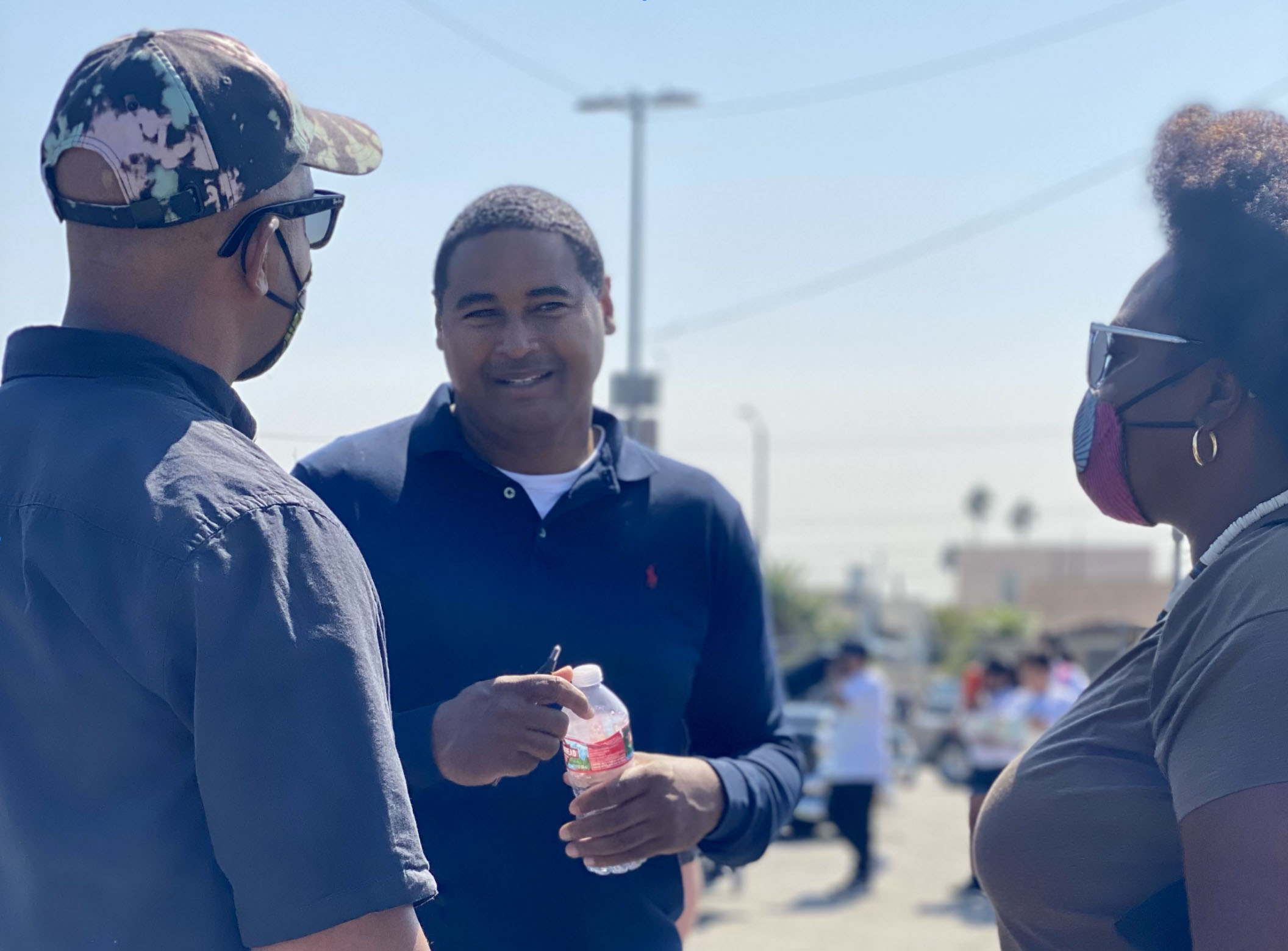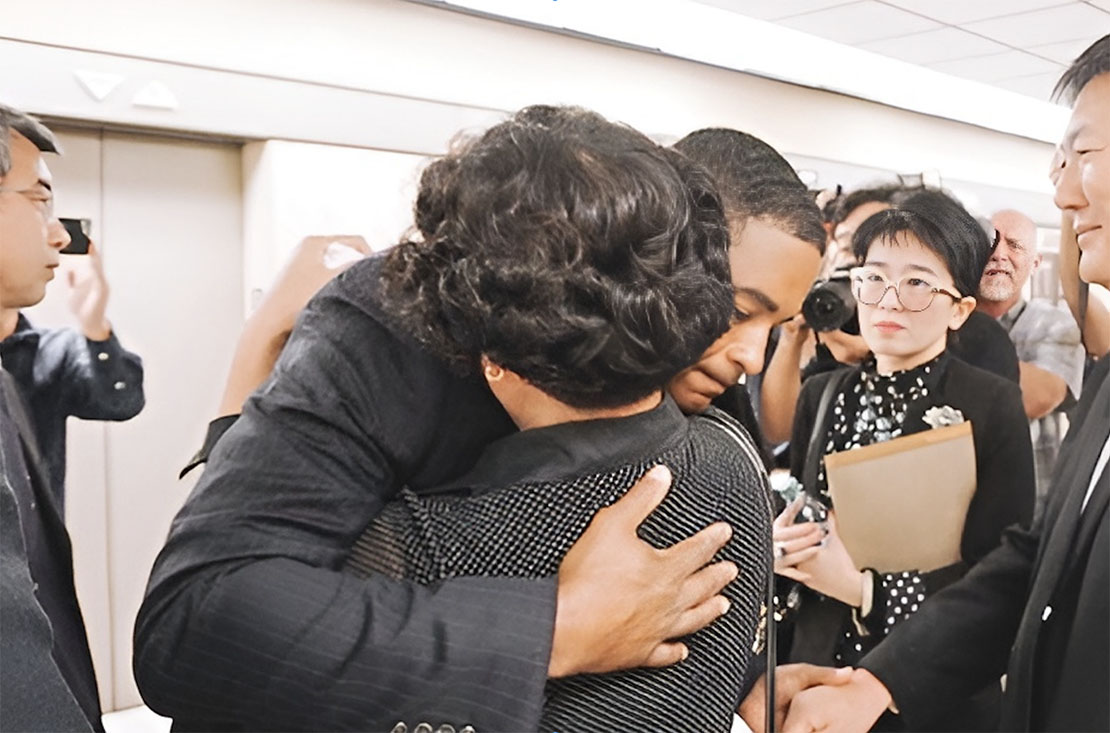
MEET JOHN
John mckinney
early years
I was born and raised in Passaic, NJ. Passaic is an old industrial working-class city in Northern New Jersey, about 30 minutes from New York City. My mom and dad passed away when I was two years old and five years old, respectively. My eldest sister, who had three children of her own, took me in and raised me and four others as a single mother. My sister worked full-time on the second shift, making it even more challenging for her to parent five children aged 5-13.
My sister, Ora Jones, whom I often refer to as mom, was a superwoman who led by example. She sacrificed much of her own life to provide for our well-being. Anything good about me is because of her. She instilled the values of hard work, persistence, sacrifice, respect for others, and service to others in all of us. I carry those values with me to this day.
I was born in one of the most tumultuous years in U.S. history, 1968. Being born in 1968 meant I was in my early teens when crack cocaine dropped like a bomb in cities all over the country. Seemingly overnight, a neighborhood became a “hood.” Seemingly overnight, many hard-working and respected men and women became crack-addicted zombies. Many of my friends who were good students or great athletes began hustling on the streets for fast and easy money. An already uneven playing field for young men my age became a minefield. The temptation to sell crack and make lots of money and the pitfall of addiction combined to create a dangerous landscape. Along with the drug trade came the ancillary problems of violence, crime, and more aggressive policing. This was the cauldron in which my young adult character was forged.
Fortunately, I had made it to my early teens before that bomb went off. My safe and nurturing home environment, combined with the values instilled in me early in life, helped me navigate a challenging environment that required a significant amount of discipline. Many of my friends, whom I loved then as I do now, succumbed to the attractive nuisance of drug dealing or addiction. Some of my friends went in and out of a revolving door of incarceration, while others, even less fortunate, started getting high on their own supply. Some who got involved in the drug game lived, and some died. There was no escaping the impact of drugs in the 80s in my neighborhood. We were all impacted by the crack epidemic in one way or another. For those who survived those dark days, we never want to see that history be repeated.
JOHN MCKINNEY
COLLEGE YEARS
I enrolled at William Paterson State College after high school, not because I wanted to go but because my sister wanted me to. After watching so many people “floss” their illicit riches around me, I wanted to make money too. I desperately wanted new clothes, a gold rope, and a car. After the first year, I dropped out of college to chase those hood trappings of success. I immediately went to work and held just about every job you could think of over the next seven years. You name it; I did it. I did everything from fast food to smithing. Yes, I worked as a blacksmith in Jersey City, NJ, where I tempered and hammered cold steel into heavy-duty truck springs. I worked in the trades as a carpenter’s apprentice and a house painter. I was a picker packer for Ethan Allen Furniture and a parts delivery driver for a Pontiac dealership. I worked at Pfizer as a temporary worker, amazed at how clean and orderly they kept their warehouse. It was so clean; you could almost eat off the floor. I remember thinking I would invest in Pfizer stock if I had the money. I’d be a very wealthy man today if I had. I did all those jobs and a few more.
I had to work hard because after I dropped out of college at 19 years old, my sister told me it was time for me to leave the nest. She said that since I was no longer in school full-time, I should work and care for myself. I remember her saying, “It’s time to spread your wings. I know you can fly.” I said, “But what if I can’t?” She smiled and said, “I know you can.” At 19, I rented a room in a boarding house and started my journey through this crazy-wonderful life.
After working for three years, I had an intellectual awakening that led me back to school. I enrolled at my local community college, where I attended classes at night while working full-time during the day. I enrolled in a full course load, including Saturdays and summer school classes. I finished community college in two years, then immediately transferred to Rutgers University, where I continued a full-time course schedule while working full-time days. While attending Rutgers, I began working as a substitute teacher in East Orange, NJ. After just two years, I completed my coursework and received my degree from Rutgers University.



Throughout my years in college, various professors mentioned that I had a keenly argumentative writing style that would work well in law practice. I hadn’t seriously considered law school until several college professors suggested it. That encouragement and idealistic notions of changing the world led me to apply to four law schools, all reasonably close to home. I had no intention of straying too far from Passaic until I got an unsolicited package from the UCLA School of Law. By then, I had already given Seton Hall Law School a deposit to hold a place, and I had every intention of going. However, a good friend insisted that I seriously consider UCLA after he learned that UCLA was ranked the 14th best law school in the country. Although I reluctantly applied, I thought it a useless exercise because there was no way I would leave the only home I knew to travel across the country without money. What ultimately happened is, to this day, hard for me to explain. I got accepted to the UCLA School of Law, and I bravely left home to travel to a place where I had never been and knew no one. I arrived on the UCLA campus on August 5, 1994, with $250.00 in my pocket. The rest, as they say, is history.


JOHN MCKINNEY
PROFESSIONAL YEARS

After graduating from the UCLA School of Law in 1997, I passed the California Bar Exam and worked as an associate attorney at a small civil litigation law firm. The following summer, I was hired by the Los Angeles County District Attorney’s Office as a Deputy District Attorney. In my first year as a Deputy District Attorney, I worked at courthouses in South Gate, Whittier, and West Covina. When I started, there was a short formal training program for new deputies before being thrown into the “fire”. On day one, I started handling a misdemeanor calendar that averaged about twenty-five cases daily. In addition, I handled all the preliminary hearings and trials that arose in my courtroom. On a typical day, my court would get through all the pre-trial matters, including plea agreements, in the morning before turning to preliminary hearings and trials in the afternoon. I would describe the first year on the job as a “baptism by fire.” The learning curve was steep, but I hit my stride by the end of the first year.
After completing the one-year probationary period, I was transferred to the Compton branch of the Superior Court. I loved my work in Compton, and that is where I came of age as a prosecutor. The culture of courthouses changes over time as people come and go. I was in Compton at the best possible time because there was unprecedented collegiality between our office and the defense bar. While I was in Compton, the media dubbed it the “love court.” There were great people in Compton everywhere you turned. As a young lawyer, I benefitted from witnessing some of the most skilled prosecutors and defense attorneys spar over serious cases. I was like a sponge soaking up all the knowledge I could from everyone, from clerks to judges. I believe everyone has something to teach. Many colorful characters frequented the Compton courthouse at that time, and each one brought something unique to the place. As for my work experience in Compton, I started prosecuting misdemeanors but soon moved on to general felony crimes. My most rewarding work came when I joined the Victim Impact Program, also known as the V.I.P. Unit.
The V.I.P. Unit comprises a small, specially trained group of prosecutors who handle cases involving special victims, like the Special Victims Unit portrayed on the NBC show “Law and Order SVU.” During my assignment in the V.I.P. Unit, I received special training to prosecute sex crimes, including adult rapes and child molestations. I also prosecuted domestic violence, child abuse, and elder abuse cases. Overall, the cases I prosecuted in the V.I.P. Unit were amongst the most challenging and rewarding in my career.
After my rotation in the V.I.P. Unit, I completed an eight-month rotation through the juvenile court system. The juvenile court system is very different from the adult criminal system; the philosophy, goals, and even the language used in juvenile court differ from those used in a criminal court. In my view, understanding the juvenile system and seeing first-hand the plight of some young people coming of age in dire circumstances is essential for all prosecutors. Many of the young people who came through my courtroom were familiar. Most of them either reminded me of myself or reminded me of friends that I grew up with. Many of the parents and guardians who appeared in court with the minors were also familiar to me. I could relate to their hardships in rearing children under difficult circumstances. Sometimes the parent or guardian was the difficult circumstance in a child’s life. The challenge in juvenile court was seldom proving a case but often trying to devise a plan of care that would effectively reform a minor’s behavior and set them on a safe, nurturing, and promising path.
After my juvenile assignment, I was transferred to the Hardcore Gang Division. At that time, the Gang Division prosecuted most of the murders in Los Angeles County. Over the next six years, I prosecuted gang-related murders and attempted murders exclusively. Generally, I carried a caseload averaging about thirty cases at any time. I typically made multiple court appearances daily in different courtrooms while managing a steady flow of trials.
While in the Gang Division, I prosecuted my first death penalty case. In that case, a van filled with five shooters blocked the victim’s car in a Taco Bell drive-thru. The shooters got out of the van and fired over forty rounds into the victim’s car. The shooters fired four handguns and an AK47. The target was a rival gangster seated in the front passenger seat of the victim’s car. While the target escaped unscathed, the shooters pumped more than a dozen rounds into the bodies of a three-year-old girl and a fourteen-year-old boy seated in the backseat. During the shooting, the little girl’s arms were nearly severed by gunfire, while the teenager’s back was riddled with large entry wounds from the AK47. The teenager’s injuries likely occurred while he attempted to shield the little girl’s body with his own. Every once in a while, a defense attorney would sarcastically ask, “What makes a crime hardcore?” Killings like the ones at Taco Bell make crimes “hardcore.” In the Taco Bell shooting case, the jury found the defendants guilty of first-degree murder and attempted murder with special circumstances. The defendants in the case were spared the death penalty and sentenced to Life Without the Possibility of Parole.
After my stint in the Gang Unit ended, I was assigned to the Major Crimes Division. The Major Crimes Division comprises a small group of attorneys who handle extraordinarily serious and complex cases, such as mass shootings and serial murders. Most of the cases involve special circumstance murders and those that arouse an intense level of public interest. Major crime cases will often involve crimes by and against celebrities and other high-profile people. A Major Crimes case can be anything from a sex crime to a gang-related murder. The attorneys in the Major Crimes Unit arrive with such a breadth of experience that they can handle any and every type of case.
I prosecuted many high-profile murder cases while assigned to the Major Crimes Division. My most recent trial involved the death of Grammy award-winning rapper, businessman, and voice of South Los Angeles, Ermias Asghedom, aka “Nipsey Hussle.” I secured a first-degree murder conviction against Eric Holder Jr. in the vicious shooting of Hussle. Nipsey’s death was a great loss to his family, fans, and the entire community in South Los Angeles.
I never met Nipsey in life, but I learned a lot about him from the many hours of videotaped interviews and the music he left behind. Unlike many rappers, Nipsey was introspective. He was a poet and a philosopher. If Nipsey had lived a long life, he would have gone on to accomplish great things beyond making music. I tell people that had Nipsey lived, his musical accomplishments would have been a mere footnote to the accomplishments he would have achieved in business, investment, and community development.
I also prosecuted the four killers of Xinran Ji. Xinran was an amazingly talented engineering student from China who won a scholarship for advanced studies at USC’s famed Verterbi School of Engineering. On the evening of July 24, 2014, Xinran wrapped up a study group session with his classmates at a home just off the USC campus. It was late, so he insisted on escorting one of his female classmates back to her apartment before walking home himself. Unbeknownst to Xinran, a group of teens aged 15-19 were driving around the USC campus looking for someone to rob. The group spotted Xinran walking alone and decided to rob him. Three perpetrators attacked Xinran and beat him mercilessly with a baseball bat and a wrench. The attack left Xinran with skull fractures and severe brain hemorrhaging. I secured first-degree murder convictions against each of the individuals who physically beat Xinran. The driver pled guilty to second-degree murder. Xinran’s family was devastated by his death. Xinran was the family’s only child under China’s then-existing one-child policy.
I have no doubt that Xinran would have contributed major innovations in robotics and mechanical engineering.
In all, I have tried nearly 40 murder cases. I gave a small piece of myself to each one. Every killer I prosecuted was convicted. Every victim’s humanity was affirmed in the courtroom.
Besides the court-related work I have done as a prosecutor, I have also participated in professional training, elementary school teaching through Project LEAD, and charity work. While at Compton, Tracy Anderson, a good friend of mine, and I began a toy drive in conjunction with the Compton Salvation Army. Although I stopped organizing the drive after transferring from Compton, I continue to contribute. I am proud that something I had a hand in starting 15 years ago has delivered thousands of toys to children in need since then. My professional career as a prosecutor is ongoing, and nothing makes me prouder than stating my appearance in court as John McKinney, “For the People!”
)
)




